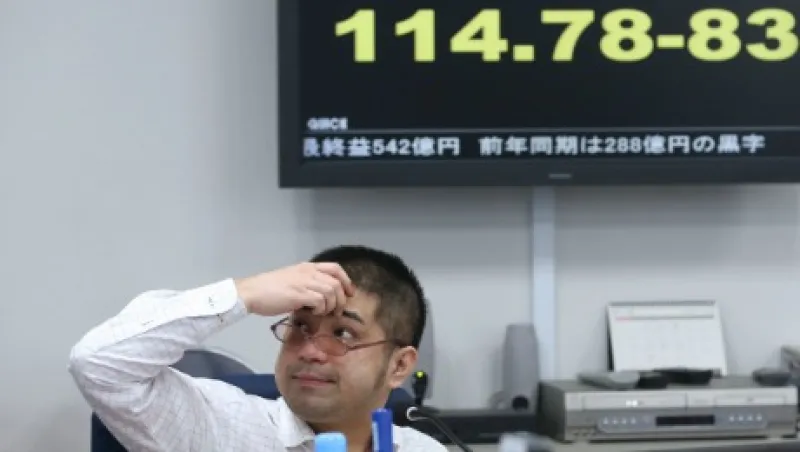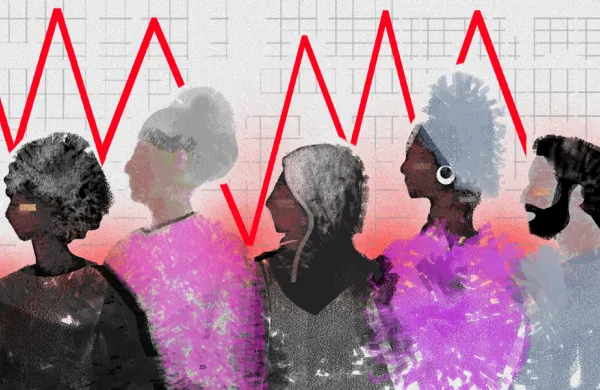Are currency traders destined for extinction? Their ranks are thinning quickly, as computers take over their tasks and banks pull back from activity in financial markets. The trend is likely to continue, and market volatility is likely to increase as a result, analysts say.
The shrinkage means “more hot potatoes, instead of people holding onto positions,” says Sassan Ghahramani, CEO of New York–based SGH Macro Advisors, which advises money managers on currency issues. Some money managers hold large currency positions, but market participants are moving out of such positions at the same time, and banks are no longer holding currency inventories to grease trading. So, when someone wants to sell a big currency position, Ghahramani says, “it’s like trying to squeeze an elephant through a keyhole. You’ll get gaps in pricing.”
The number of people working in front-office currency market jobs for ten of the world’s biggest banks fell 23 percent between 2010 and 2014, to 2,300, according to London research firm Coalition Development. Meanwhile, currency trading volume averaged $4.8 trillion a day in January, down from a record $6 trillion a day at the end of 2014, according to multicurrency settlement service provider CLS Group.
The automation of currency trading is having an impact in two different ways. First, it’s eliminating the need for brokers. Traders and investors can trade directly with counterparties, or through banks using online platforms, without dealing with humans. Second, investors and speculators who take big currency positions now often use a computer algorithm to determine their trade, rather than human judgment.
“It’s man-versus-machine issues,” says David Gilmore, a partner at Foreign Exchange Analytics, a currency research firm in Essex, Connecticut. “Electronic trading platforms are a big factor eroding employment in the forex market.” Those platforms give users multiple quotes for each currency pair, something customers demand, he notes. In the past, corporations and investors would communicate with currency salespeople at banks for price quotes.
As for investors and speculators, swashbucklers like George Soros made legends for themselves by taking outsize bets based on their view of market fundamentals. Soros reportedly made $1 billion in 1992 by correctly wagering that the Bank of England would stop defending the pound.
“So what does George Soros 2.0 look like?” asks Robert Savage, CEO of CCTrack Solutions, a New York currency investment advisory service. Most macro traders have proved unable to succeed consistently in the currency market, he notes. “You need to have a systematic approach to markets.” And that means computerized trading. But computerized trading doesn’t completely knock out humans, he says. Whoever runs a computerized trading system often has discretion to make changes in it. “Discretionary systematic trading has become the new macro style,” Savage says.
When it comes to banks, increased regulation spurred much of the reductions in currency staff. In the U.S., the 2010 Dodd-Frank Wall Street Reform and Consumer Protection Act forced banks to hold more capital against speculative activity, and the law’s Volcker Rule largely forbids banks to engage in proprietary trading. In addition, regulators in the U.S. and Europe fined major banks billions of dollars in 2014 and 2015 for rigging currency rates.
As a result, banks’ currency salespeople must be very cautious about what information they give to customers, making the salespeople less useful for customers and their employers. “Salespeople are under a lot of restrictions on how they communicate,” Gilmore says. “They used to make reference to big trades that had been made to give customers an idea of flow. The color traditionally provided to the buy side has been regulated away.”
There’s no trust issue with computers. “Banks may feel that computers are less likely to collude,” says Marshall Gittler, head of investment research at FXPrimus, a Cyprus-based currency brokerage. Banks are generally shying away from currency, bond and commodity trading, hoping other business areas can prove more profitable.
The pullback means that banks are no longer acting as market makers and no longer ensuring liquidity in times of market volatility. And that means choppier trading conditions. Just like stock and bond markets, currencies have experienced flash crashes in the past few years.
For example, in January 2015, the Swiss National Bank announced an abandonment of its effort to keep the euro above 1.2 Swiss francs, and within five minutes the euro dropped 30 percent. “Banks that typically would have taken the other side of the trade would have created a lot more circuit breakers,” Ghahramani says. “But they weren’t there.”
The market shrinkage will continue, he and others say. “Technology won’t roll backwards,” as Ghahramani puts it. And that means more bouts of intense volatility in currency rates, analysts say. The shrinkage feeds volatility, making trading more dangerous and thus leading to more shrinkage, Gilmore says. “It’s a feedback loop.”







